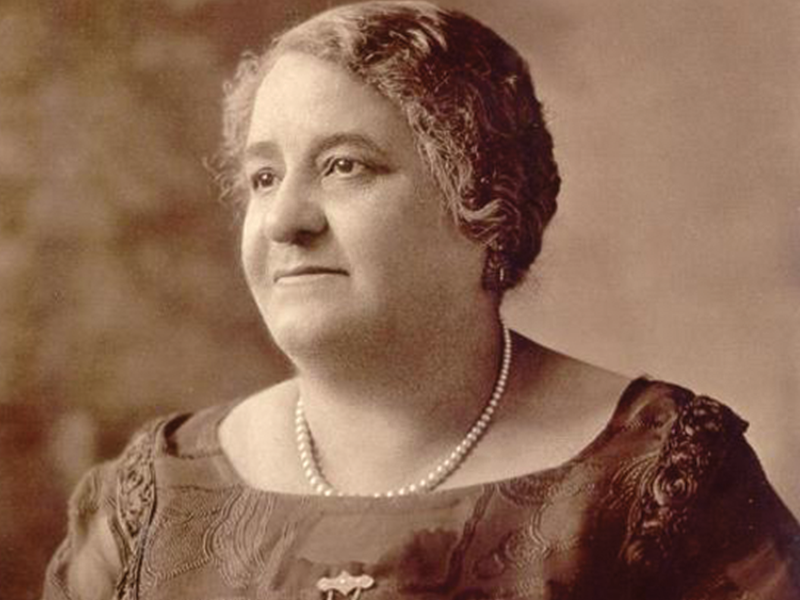Black History Month
In honor of Black History Month, Lyman Howell reminds us of the important work of Maggie L. Walker, an African-American and the first female to establish a bank in the US.

Maggie L. Walker - The Importance of Business Ownership, by Lyman Howell
In 1903, Maggie Lena Walker, an African-American woman in Richmond, Virginia, founded the St. Luke’s Penny Savings Bank. By this act of business leadership, she became the first female in the country to establish a bank and to become its president. Through the work of role models like Maggie Walker and others like her, we can learn principles to strengthen the growth of business ownership in our communities.
Maggie Walker had a vision to strengthen the economic vitality of her community. Her community was less than forty years out from freedom from slavery, and Richmond had been the capital of the Confederate South. How was her community going to survive and thrive if it did not own its businesses? Because they were African-American, members of her community had difficulty getting loans from local banks. Some of the local banks would not even accept deposits from them. She had a vision to mobilize savings and to provide loans to help her people.
"First we need a savings bank. Let us put our moneys together; let us use our moneys; let us put our money out at usury among ourselves, and reap the benefit ourselves. Let us have a bank that will take the nickels and turn them into dollars." ~Maggie L. Walker, Independent Order of St. Luke, Annual Convention, August 20, 19011
She leveraged the strengths of her community and natural network. She started the bank by working through her local Christian, community organization, the Independent Order of St. Luke (IOSL). The Executive Directors of IOSL became the initial Board of Directors of St. Luke Penny Savings Bank. Her bank sold stock ownership only to IOSL members, and she mobilized IOSL members to open bank accounts.1 Today we can learn from Mrs. Walker and her community. She cast a vision to the community, focused on a natural target market, and the community members trusted her institution enough to open accounts. We need to work intentionally to do business with entrepreneurs in our communities. The circulating dollars help to create jobs and to build wealth.
Maggie Walker was a role model to future leaders. When my mother walked home daily from school in Richmond, VA, she would see Mrs. Walker sitting on her porch, waving and encouraging the young students. She helped the children to save pennies in piggy banks so that they could eventually open real accounts at her bank.1Everyone knew that the founder of the local bank was in their community. Today she still is a role model for us because of her courage to dream, her persistence to turn her dreams into reality, her leadership, and her passion to help others. Because she was inducted into the Junior Achievement U.S. Business Hall of Fame in 2001, students around the U.S. are still learning about her accomplishments.2
In the same way that business ownership was critical then, it is still critical today. Business owners create jobs. Entrepreneurship is one of the proven ways for households and communities to create wealth, to accumulate wealth, and to leave a legacy.
Successful business owners, including successful small business owners, are the wealthiest group of people in America. Many use estate planning to support charitable causes while also leaving legacies to their families. Who has not witnessed the impact of the Kroc Foundation’s (McDonalds) donation to the Salvation Army to build major community centers in Chicago and other cities? The Annie E. Casey Foundation (UPS) has worked to promote the welfare of children in America. The Gates Foundation (Microsoft) fights global poverty issues.
There are many lessons we can apply from Mrs. Maggie Walker’s example to today. What steps are we taking to use the products and services of businesses in our communities? What steps are we taking to encourage others to own businesses? How are we striving to become business owners and investors in businesses instead of only consumers? How are we striving to deliver products and services that can add value in our economy, leveraging our passion, skills, and talents? How are we planning to leave legacies to our families and our communities? These are important questions that can lead us to a greater impact in our communities.
Lyman Howell, MBA, CFP® is the President of Regal Oak Financial, LLC, a Registered Investment Advisory firm in Illinois. His firm offers financial planning and investment advisory services to clients on their journeys to accumulate, protect, and transfer wealth. He encourages clients to take concrete steps today so that, in the future, they will become like oak trees, strong and stable. You can contact him at:
- Phone: 866-734-2562 (866 Regal Oak)
- Email: lhowell@regaloakfinancial.com
- Website: regaloakfinancial.com
References for this Article
- Maggie L. Walker, National Historic Site, National Park Service, https://www.nps.gov/mawa/the-st-luke-penny-savings-bank.htm
- Maggie L. Walker – Wikipedia, https://en.wikipedia.org/wiki/Maggie_L._Walker
